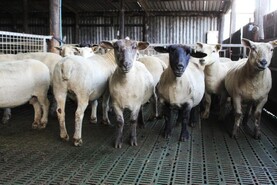With a labour shortage causing problems in many areas of the agriculture sector, management consultant Nollaig Heffernan had some timely advice for farmers at the recent Irish Pig Health Society’s symposium.
Heffernan is a specialist in leadership and organisational psychology and spoke about what it takes to become an employer that can attract and retain highly talented workers.
She told farmers that becoming an employer of choice, where you can pick and choose who you hire, is something that takes a few years to build towards.
She outlined areas where employers need to assess in relation to their current and future staff.
Role clarity
Lack of role clarity is the leading cause of job dissatisfaction in the workplace.
Unhappy workers will ask themselves things like 'what am I doing here' and 'what do I contribute'.
In toxic businesses, it is common that employees feel that they were lied to - that they came in thinking they were doing one thing and end up doing something vastly different.
This creates an insecurity and workers may feel worried about being found out, a thing in psychology called the imposter phenomenon.
Without clear and defined roles, stress and anxiety are immediately caused in the workplace.
Business awareness
A lot in companies lack business awareness, in terms of what they actually need.
Hiring is often a knee-jerk reaction and employers often just take what they can get.
If you just hire what you can get, it’s usually not what you want.
It is really important to understand what is required in your business.
Take a look at where the business is going, its aims and what resources are needed to meet these aims.
Look internally
Employers can be very good at looking outside for solutions when actually promoting the people inside is usually the better option and is very cost effective.
Look at people who are already in your business first; they might be aiming to push on and work in a higher role.
Even if there are no vacancies, it may be no harm to sit down with each employee and get to know their ambitions – ask them where they see themselves in five years. This way you can plan for the future.
Farming and the agriculture sector in general has a low tolerance for bringing in new people into the system, especially people from non-farming backgrounds.
Heffernan said that farmers, because they’ve been farming all their life, they don’t even know what they know innately.
This causes huge frustration when someone new doesn’t pick it up straight away.
Realise that getting the best out of people takes time, communication and tolerance, she advised.
When you bring people into your business, make sure you are ready and able to facilitate them.
While it is important to show common sense and decency to new workers, keeping them accountable is important.
If you want to protect your business objectives, you need to micro manage from the beginning and set standards.
Continuous improvement
A good employer sees their staff as an asset and not a cost.
People treat assets as valuable and ideally want to sell them on at a higher price than what they got it for.
Employers often are afraid to invest in their staff, as they are afraid they will move to a higher role elsewhere.
This may be true to a certain extent, but even so, if your business is seen as a place where employees can better themselves, you will have people wanting to work for you and you are moving your business towards being employers of choice.
Offer alternatives
A basic business technique of a SWOT analysis can help.
Look at the strengths, weaknesses, opportunities and threats to your business.
The agricultural industry is a difficult industry as it is, before taking into account isolated locations, poor internet access or long working hours.
But these factors are the reality and can’t be changed easily, so as an employer you must look at what you can offer to override these problems.
It is up to you to generate interest. Think things like flexible work hours, incentives to work during unsocial times, consistent work patterns or progression opportunities.
Be inquisitive
Look at other businesses. Look at the way they do things and what they are offering.
Don’t be afraid to communicate and question your employees about their work life.
Ask them what is their deal breaker - the one thing that would make them leave straight away.
Everyone has a deal breaker and they’re usually small things you can control such as respect or inclusion.
Word of mouth is probably the best method for hiring.
Take your time to ask your staff if they know anyone who would like to work for you.
They won’t want to let their own reputation down and will hire someone they think will be more than capable for the role.
Read more
What do employers and employees want on a farm?
With a labour shortage causing problems in many areas of the agriculture sector, management consultant Nollaig Heffernan had some timely advice for farmers at the recent Irish Pig Health Society’s symposium.
Heffernan is a specialist in leadership and organisational psychology and spoke about what it takes to become an employer that can attract and retain highly talented workers.
She told farmers that becoming an employer of choice, where you can pick and choose who you hire, is something that takes a few years to build towards.
She outlined areas where employers need to assess in relation to their current and future staff.
Role clarity
Lack of role clarity is the leading cause of job dissatisfaction in the workplace.
Unhappy workers will ask themselves things like 'what am I doing here' and 'what do I contribute'.
In toxic businesses, it is common that employees feel that they were lied to - that they came in thinking they were doing one thing and end up doing something vastly different.
This creates an insecurity and workers may feel worried about being found out, a thing in psychology called the imposter phenomenon.
Without clear and defined roles, stress and anxiety are immediately caused in the workplace.
Business awareness
A lot in companies lack business awareness, in terms of what they actually need.
Hiring is often a knee-jerk reaction and employers often just take what they can get.
If you just hire what you can get, it’s usually not what you want.
It is really important to understand what is required in your business.
Take a look at where the business is going, its aims and what resources are needed to meet these aims.
Look internally
Employers can be very good at looking outside for solutions when actually promoting the people inside is usually the better option and is very cost effective.
Look at people who are already in your business first; they might be aiming to push on and work in a higher role.
Even if there are no vacancies, it may be no harm to sit down with each employee and get to know their ambitions – ask them where they see themselves in five years. This way you can plan for the future.
Farming and the agriculture sector in general has a low tolerance for bringing in new people into the system, especially people from non-farming backgrounds.
Heffernan said that farmers, because they’ve been farming all their life, they don’t even know what they know innately.
This causes huge frustration when someone new doesn’t pick it up straight away.
Realise that getting the best out of people takes time, communication and tolerance, she advised.
When you bring people into your business, make sure you are ready and able to facilitate them.
While it is important to show common sense and decency to new workers, keeping them accountable is important.
If you want to protect your business objectives, you need to micro manage from the beginning and set standards.
Continuous improvement
A good employer sees their staff as an asset and not a cost.
People treat assets as valuable and ideally want to sell them on at a higher price than what they got it for.
Employers often are afraid to invest in their staff, as they are afraid they will move to a higher role elsewhere.
This may be true to a certain extent, but even so, if your business is seen as a place where employees can better themselves, you will have people wanting to work for you and you are moving your business towards being employers of choice.
Offer alternatives
A basic business technique of a SWOT analysis can help.
Look at the strengths, weaknesses, opportunities and threats to your business.
The agricultural industry is a difficult industry as it is, before taking into account isolated locations, poor internet access or long working hours.
But these factors are the reality and can’t be changed easily, so as an employer you must look at what you can offer to override these problems.
It is up to you to generate interest. Think things like flexible work hours, incentives to work during unsocial times, consistent work patterns or progression opportunities.
Be inquisitive
Look at other businesses. Look at the way they do things and what they are offering.
Don’t be afraid to communicate and question your employees about their work life.
Ask them what is their deal breaker - the one thing that would make them leave straight away.
Everyone has a deal breaker and they’re usually small things you can control such as respect or inclusion.
Word of mouth is probably the best method for hiring.
Take your time to ask your staff if they know anyone who would like to work for you.
They won’t want to let their own reputation down and will hire someone they think will be more than capable for the role.
Read more
What do employers and employees want on a farm?






 This is a subscriber-only article
This is a subscriber-only article









SHARING OPTIONS: